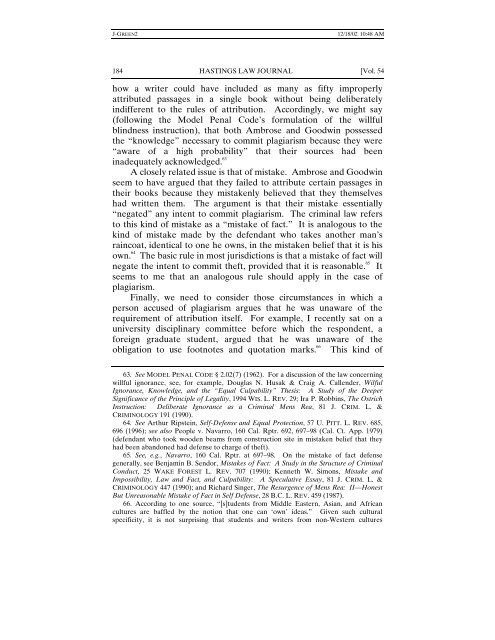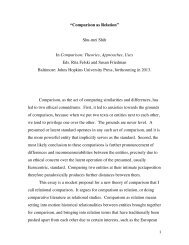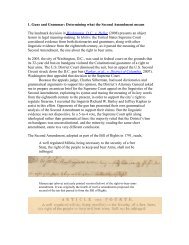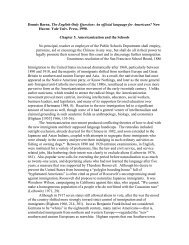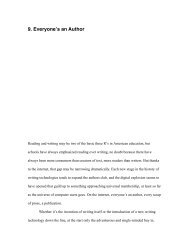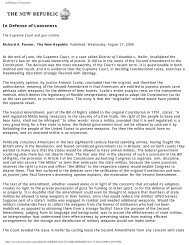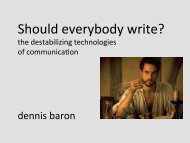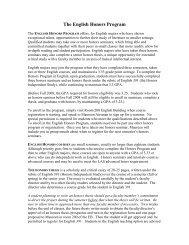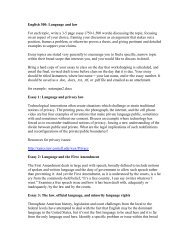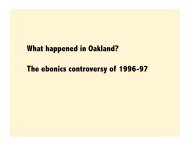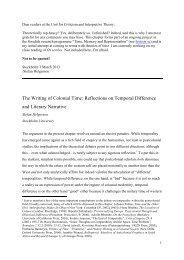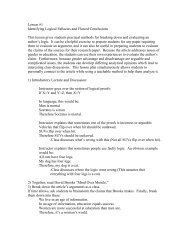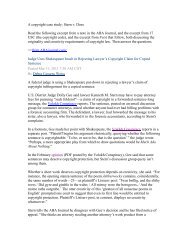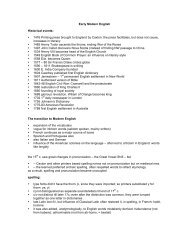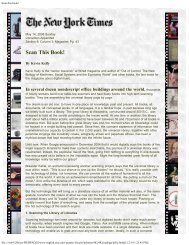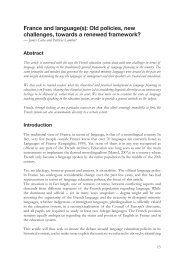Plagiarism, Norms, and the Limits of Theft Law: Some ... - English
Plagiarism, Norms, and the Limits of Theft Law: Some ... - English
Plagiarism, Norms, and the Limits of Theft Law: Some ... - English
You also want an ePaper? Increase the reach of your titles
YUMPU automatically turns print PDFs into web optimized ePapers that Google loves.
J-GREEN2 12/18/02 10:48 AM<br />
184 HASTINGS LAW JOURNAL [Vol. 54<br />
how a writer could have included as many as fifty improperly<br />
attributed passages in a single book without being deliberately<br />
indifferent to <strong>the</strong> rules <strong>of</strong> attribution. Accordingly, we might say<br />
(following <strong>the</strong> Model Penal Code’s formulation <strong>of</strong> <strong>the</strong> willful<br />
blindness instruction), that both Ambrose <strong>and</strong> Goodwin possessed<br />
<strong>the</strong> “knowledge” necessary to commit plagiarism because <strong>the</strong>y were<br />
“aware <strong>of</strong> a high probability” that <strong>the</strong>ir sources had been<br />
inadequately acknowledged. 63<br />
A closely related issue is that <strong>of</strong> mistake. Ambrose <strong>and</strong> Goodwin<br />
seem to have argued that <strong>the</strong>y failed to attribute certain passages in<br />
<strong>the</strong>ir books because <strong>the</strong>y mistakenly believed that <strong>the</strong>y <strong>the</strong>mselves<br />
had written <strong>the</strong>m. The argument is that <strong>the</strong>ir mistake essentially<br />
“negated” any intent to commit plagiarism. The criminal law refers<br />
to this kind <strong>of</strong> mistake as a “mistake <strong>of</strong> fact.” It is analogous to <strong>the</strong><br />
kind <strong>of</strong> mistake made by <strong>the</strong> defendant who takes ano<strong>the</strong>r man’s<br />
raincoat, identical to one he owns, in <strong>the</strong> mistaken belief that it is his<br />
own. 64 The basic rule in most jurisdictions is that a mistake <strong>of</strong> fact will<br />
negate <strong>the</strong> intent to commit <strong>the</strong>ft, provided that it is reasonable. 65 It<br />
seems to me that an analogous rule should apply in <strong>the</strong> case <strong>of</strong><br />
plagiarism.<br />
Finally, we need to consider those circumstances in which a<br />
person accused <strong>of</strong> plagiarism argues that he was unaware <strong>of</strong> <strong>the</strong><br />
requirement <strong>of</strong> attribution itself. For example, I recently sat on a<br />
university disciplinary committee before which <strong>the</strong> respondent, a<br />
foreign graduate student, argued that he was unaware <strong>of</strong> <strong>the</strong><br />
obligation to use footnotes <strong>and</strong> quotation marks. 66 This kind <strong>of</strong><br />
63. See MODEL PENAL CODE § 2.02(7) (1962). For a discussion <strong>of</strong> <strong>the</strong> law concerning<br />
willful ignorance, see, for example, Douglas N. Husak & Craig A. Callender, Wilful<br />
Ignorance, Knowledge, <strong>and</strong> <strong>the</strong> “Equal Culpability” Thesis: A Study <strong>of</strong> <strong>the</strong> Deeper<br />
Significance <strong>of</strong> <strong>the</strong> Principle <strong>of</strong> Legality, 1994 WIS. L. REV. 29; Ira P. Robbins, The Ostrich<br />
Instruction: Deliberate Ignorance as a Criminal Mens Rea, 81 J. CRIM. L. &<br />
CRIMINOLOGY 191 (1990).<br />
64. See Arthur Ripstein, Self-Defense <strong>and</strong> Equal Protection, 57 U. PITT. L. REV. 685,<br />
696 (1996); see also People v. Navarro, 160 Cal. Rptr. 692, 697–98 (Cal. Ct. App. 1979)<br />
(defendant who took wooden beams from construction site in mistaken belief that <strong>the</strong>y<br />
had been ab<strong>and</strong>oned had defense to charge <strong>of</strong> <strong>the</strong>ft).<br />
65. See, e.g., Navarro, 160 Cal. Rptr. at 697–98. On <strong>the</strong> mistake <strong>of</strong> fact defense<br />
generally, see Benjamin B. Sendor, Mistakes <strong>of</strong> Fact: A Study in <strong>the</strong> Structure <strong>of</strong> Criminal<br />
Conduct, 25 WAKE FOREST L. REV. 707 (1990); Kenneth W. Simons, Mistake <strong>and</strong><br />
Impossibility, <strong>Law</strong> <strong>and</strong> Fact, <strong>and</strong> Culpability: A Speculative Essay, 81 J. CRIM. L. &<br />
CRIMINOLOGY 447 (1990); <strong>and</strong> Richard Singer, The Resurgence <strong>of</strong> Mens Rea: II—Honest<br />
But Unreasonable Mistake <strong>of</strong> Fact in Self Defense, 28 B.C. L. REV. 459 (1987).<br />
66. According to one source, “[s]tudents from Middle Eastern, Asian, <strong>and</strong> African<br />
cultures are baffled by <strong>the</strong> notion that one can ‘own’ ideas.” Given such cultural<br />
specificity, it is not surprising that students <strong>and</strong> writers from non-Western cultures


